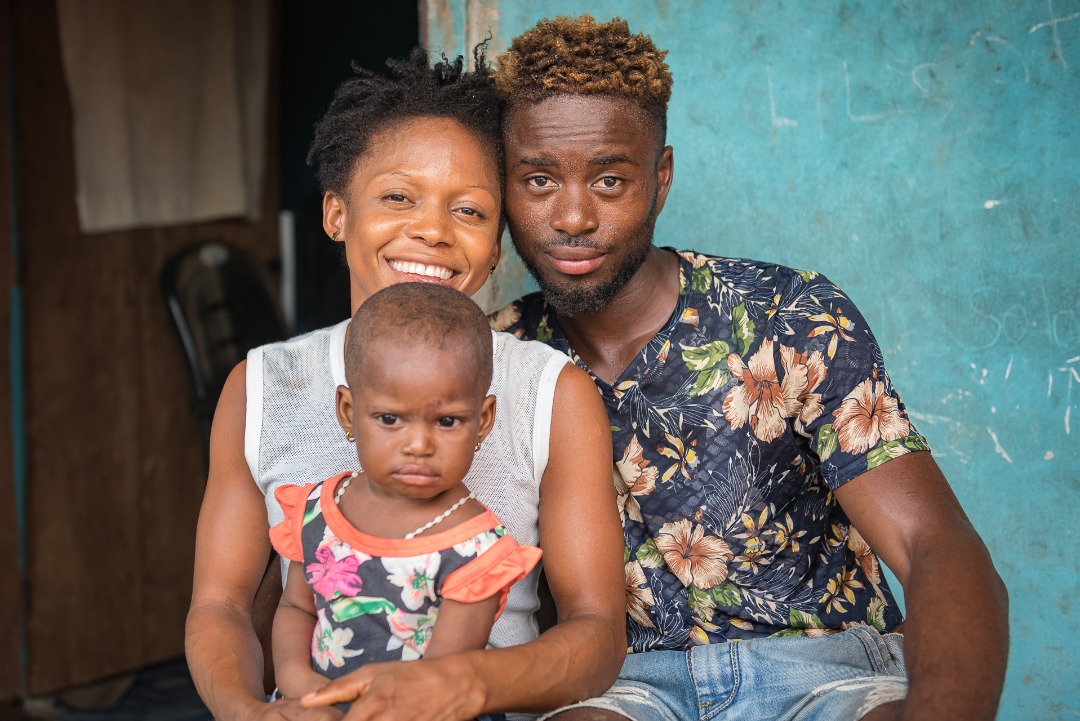By Thelma Chioma Thomas and Onyinye Oranezi (Lead Writers)
Pathfinder International started in Nigeria in 1965 when Dr. Clarence Gamble and his wife Sarah Gamble came to Nigeria in the hopes of laying a foundation for his work. Fifty-five years later, their journey has transformed lives and led to significant changes in Nigeria’s sexual and reproductive health space.
With an estimated population of 196 million people, and a poorly managed and funded health care system, millions in Nigeria still lack access to essential health services. Eighty-six percent of married women of reproductive age aren’t using a modern method of contraception. Each year, an estimated 58,000 women die from pregnancy and childbirth complications in Nigeria, second only to India in terms of maternal deaths.
With the vision that every person, regardless of where they live, has a right to sexual and reproductive health, Pathfinder International Nigeria partners with local organisations to make sure the hardest-to-reach people have access to life-saving services.
In celebration of these landmark achievements over the last 55 years in Nigeria, Pathfinder International organised a webinar themed “Evolution of Sexual and Reproductive Health in Nigeria: The Past, the Present, and the Future.” Over 200 hundred health professionals and advocates in the sexual and reproductive health space attended the event.
Moderator and Chief Executive Officer of the International Society of Media in Public Health (ISMPH), Moji Makanjuola, noted that for many decades Pathfinder International Nigeria has impacted the lives of Nigerians. “We are here to celebrate the entity that binds all of us together and adds value to our lives,” she said.
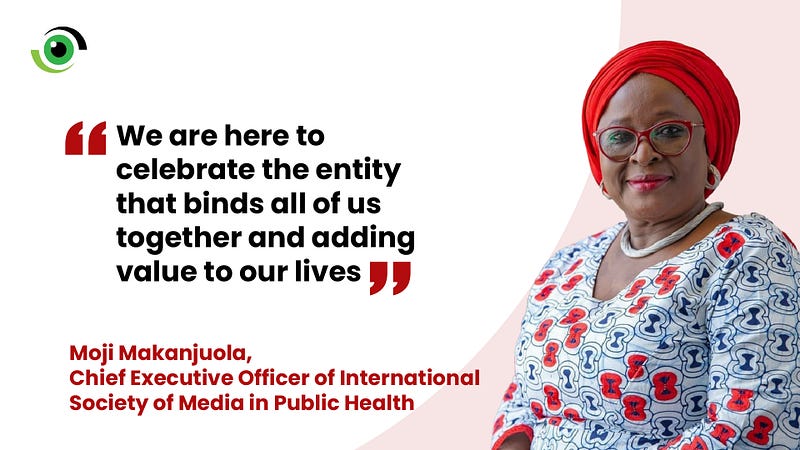
The current Board Chair, Roslyn Watson said Nigeria has been a significant part of Pathfinder since the beginning of the organisation. The Pathfinder team worked hand in hand with communities and public health systems to enable women, men and young people to live their healthiest sexual and reproductive lives. In 1988, Pathfinder led the largest Africa family planning and reproductive health program. The team worked with the government and partners to establish systems for data collection and contraceptive supplies management. This formed the foundation for all their family planning projects across the globe today. The conception and development of that project started in Nigeria and demonstrated a sustainable path that advances reproductive health and rights.
“The lessons learned here have not only provided the foundation for this country Nigeria but have exceeded Pathfinder programs elsewhere and been a real model that has provided thought leadership to our organization,” Watson said, adding “Today is a well deserved 55th birthday celebration. I salute that, but we will not just explore where Pathfinder has been but what it can be in the future. We are poised to evolve as Pathfinder is a leading organisation in our Space”.
President and Chief Executive Officer of Pathfinder International Lois Quam, in her opening remarks highlighted some of the outstanding achievements of the organisation. These include continuous provision of services during the Biafran civil war when many international reproductive health and other health organisations stopped and left Nigeria. Pathfinder, led by Nigerians, stayed and continued to provide services during the war, and during the important post-war period.
“We look to Pathfinder in providing leadership, not only in Nigeria for the important work around family planning but to teach all of us what we need to do globally to confront this demanding moment. We have been in this demanding moment before, but as Pathfinders we will find the Path,” Quam said.
Breaking boundaries in sexual and reproductive health
Mike Egboh, Country Director, GHSC-PSM Project, was a panelist at the webinar. He said his mother passed on during childbirth and this inspired him to join Pathfinder many years ago to ensure more women don’t die from rights related issues. “I lost my mother in the labour room after delivery, precisely in 1975, at a time when she should not have been pregnant, because she could not negotiate with my father. It was a rights issue. This is what defined me and made me join Pathfinder. I wanted to make sure that other women didn’t die the way my mother died,” he said.
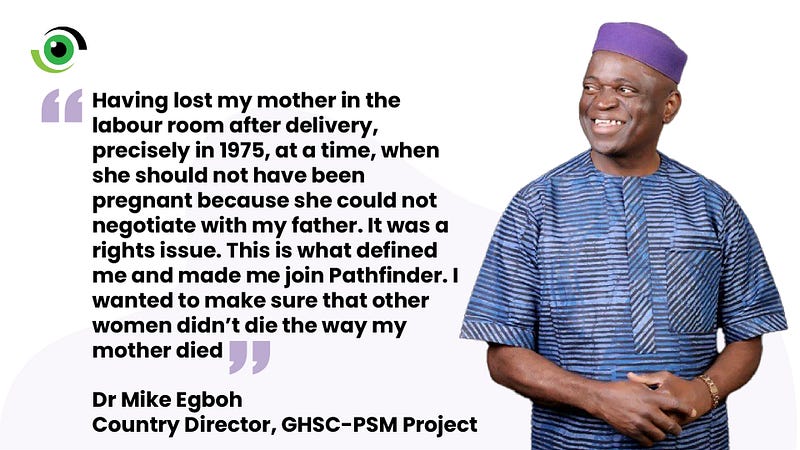
Since then, he has been part of the organisation’s transformational work. “Pathfinder supported the establishment of Planned Parenthood Federation of Nigeria. We established centres of Excellence, family planning training programs at the University College Hospital Ibadan, and in all the major teaching hospitals in Nigeria. Training centres were established for training of nurses and doctors,” Egboh said. “The first HIV project in Nigeria supported by DFID and implemented in Benue State was brought to Nigeria by Pathfinder. The Sudanese government adopted our traditional birth attendants training manual with islamic principles. At Pathfinder, we touch and change lives, we restore homes. We provide voice for the voiceless, we strengthen families, and we take risks,’’ he added.
Promoting community acceptance of SRH services
“The resistance to reproductive health issues, particularly in the northern part of the country where I come from is unbelievable, and this has gone on for many years”, The Emir of Shonga, His Royal Highness (HRH) Dr. Haliru Yahaya, said. A panelist at the webinar, he shared perspectives on how Pathfinder supported traditional rulers to improve acceptance of SRH services. He said Islamic scholars had a field day because they had their own interpretations of reproductive health issues. HRH Dr Yahaya said “My dual advantage from the medical side and the Islamic side made it easier to start a conversation. The book titled ‘Sexual Reproductive Rights: Islamic Perspectives’ has been a game changer”. This book was developed with support of Pathfinder International. He also said “If we must progress in this country, we must pay attention to the health of the girl child and empower her. The education of the girl child is very important,”
Unpacking the experiences of Nigerian Women
The National Council for Women Societies (NCWS) is the umbrella body of all Nigerian women societies, groups and individuals. The organisation was founded in 1958 and has presence in the 36 states and 774 local government areas of Nigeria. NCWS President, Dr. Mrs Gloria Laraba Shoda noted that Nigerian women are key to the country’s development as they run the micro-economy of Nigeria. “Healthcare should be free for women. Cost of healthcare services makes it difficult for women in the rural areas to access quality health services. We also have the problem of waiting time especially at the public health facilities due to limited personnel. During the pandemic, Nigeria recorded high rates of sexual harassment and unplanned pregnancies. Most women were not able to go to the hospital because of the lock down,” Dr. Shoda said.
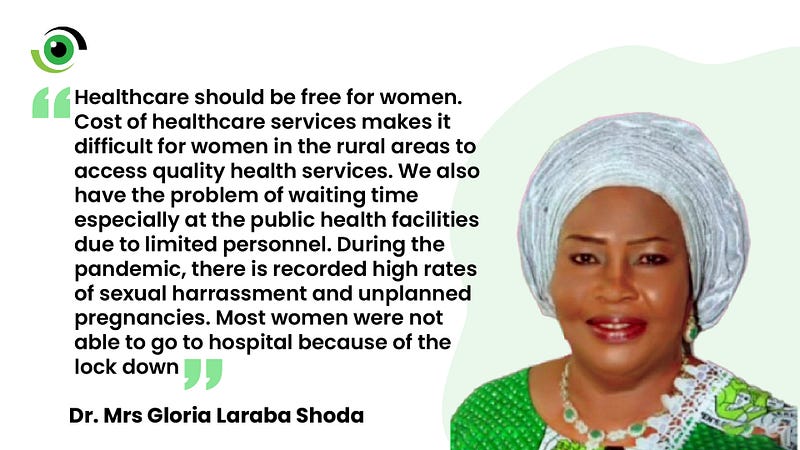
She recommended that the government should enforce policies that make maternal and child healthcare (MNCH) services free at all levels. She added that dedicated funds should be allocated for MNCH, released and disbursed early. Also, she recommended there should be improved outreach services to hard-to-reach communities such as improvised healthcare centres.
An important demographic — young people
Precious Anslem, Program Coordinator at the Youth Friendly Centre in Kuje, Abuja, said that contrary to popular opinion that young people don’t like accessing SRH services, they access services when the services are professional, friendly, unbiased, non-judgmental, and accessible. Pathfinder International has supported young people by training them to make informed decisions on their sexual and reproductive health in order to delay pregnancies and maximise their potential.
He highlighted some of the challenges encountered by young people in accessing SRH services in Nigeria. They include cost of services, access to HIV services, religious and cultural barriers. To close these gaps, Anslem suggested more strategic investments in adolescent sexual reproductive health and capacity building of young people by the government, NGOs, CSOs and donors. “We need to employ them to lead interventions because there is no better way to solve the issue than the people who experience it themselves. Also, young people should keep advocating, keep making your voices heard, don’t let anyone tell you that you can’t do it,” Anslem said.
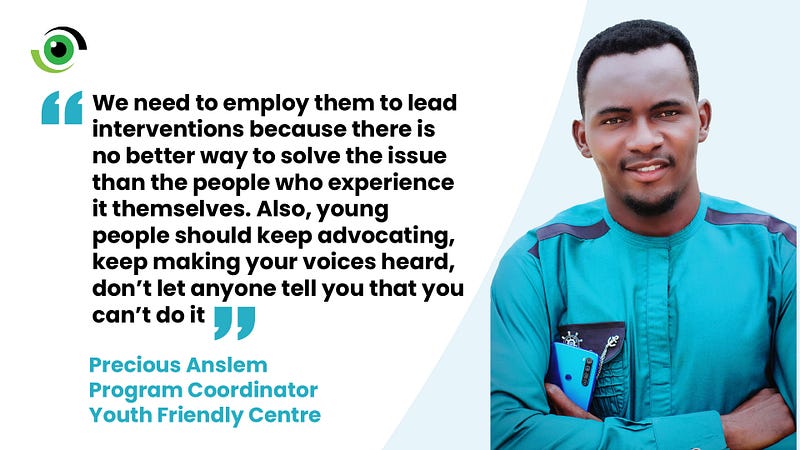
Looking beyond the COVID-19 pandemic
Dr Salma Anas-Kolo, Director Family Health at the Federal Ministry of Health (FMOH) said
COVID19 has affected all sectors of development, the worst being the health sector. The effect is felt mostly among vulnerable people. It also exposed girls to various obstetrics and gynaecology problems like haemorrhage, abortion and disruption of HIV services and care. “We saw more pregnancies and rape cases across the country. Also, it exposed the unsystematic delivery of health services such as referral linkages within states and revealed the huge funding gaps,” Dr Anas-Kolo said.
“However, the FMOH ensured that the distribution of family planning services in Nigeria is sustained despite the surge of the virus and this is to protect our women from unplanned pregnancies especially in the rural communities. Lessons learned was that the weaknesses in the health sector were fully acknowledged at the highest level especially policy makers,” she added.
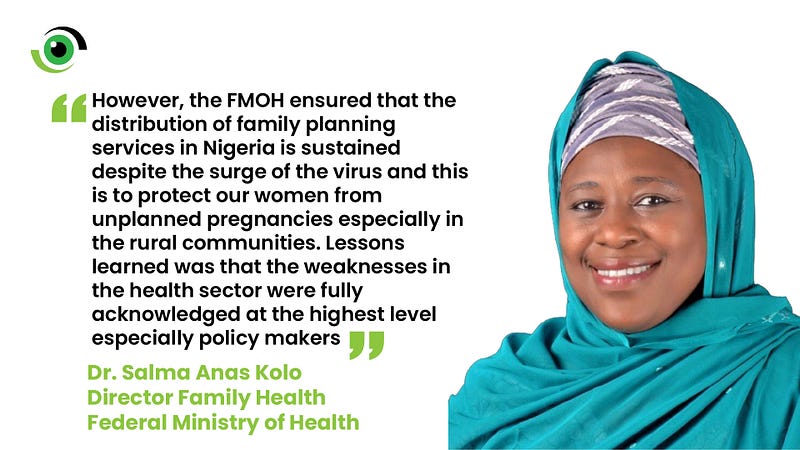
Looking forward, she said policies and strategies must be gender responsive and tailored to respond to public health beyond any pandemic that may happen in the future. She also recommended building strong and resilient health systems at all levels of care that will stand the test of time and be able to cope with public health emergencies, with all essential services, especially maternal and newborn services. Finally, there is a need to invest in SRH in Nigeria by using innovative approaches to involve the private sector to help bridge funding gaps and ensure quality care is provided.
Webinar host and Country Director Pathfinder International, Dr. Amina Dorayi, in her closing remarks said the year has been very special not only for Pathfinder in Nigeria. “It marks a milestone for the SRH landscape in our country. Since 1965, the sexual and reproductive health ecosystem has evolved significantly,” she said, adding, “Pathfinder is driven by the conviction that all people regardless of where they live have the right to decide whether and when to have children, to exist free from fear and stigma, and to live the lives they choose. At Pathfinder we are guided by a quote by Antonio Machado that says ‘Traveller there is no path, paths are made by walking’.”
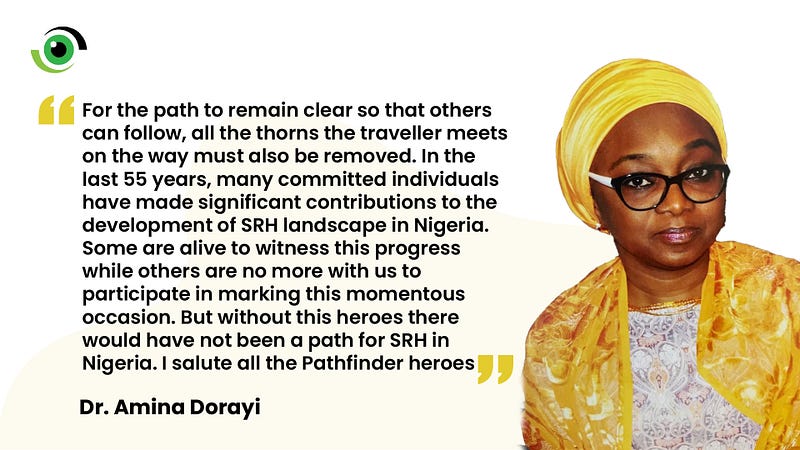
She concluded by acknowledging all individuals who have created paths and continued to create paths for improved health in Nigeria “For the path to remain clear so that others can follow, all the thorns the traveller meets on the way must also be removed. In the last 55 years, many committed individuals have made significant contributions to the development of the SRH landscape in Nigeria, some are alive to witness this progress while others are no more with us to participate in marking this momentous occasion. But without these heroes there would have not been a path for SRH in Nigeria. I salute all the Pathfinder heroes”, she said.
Congratulations to the Pathfinder International Nigeria team for 55 years of impact! Use the hashtag #PathfinderNigeria55 to follow the conversation on our social media handles, @nighealthwatch on Twitter and @nigeriahealthwatch on Facebook and Instagram.


